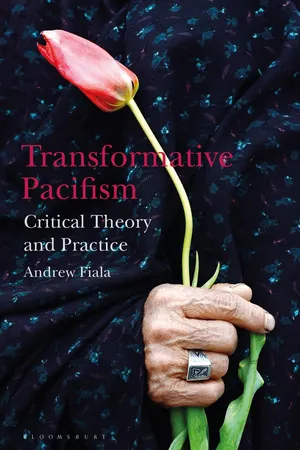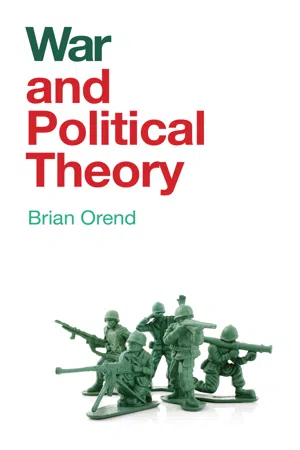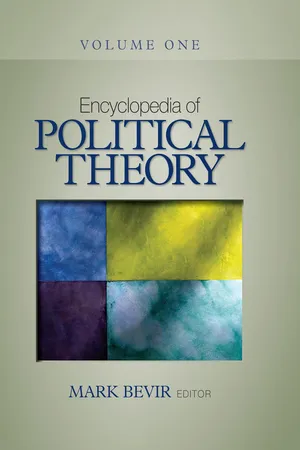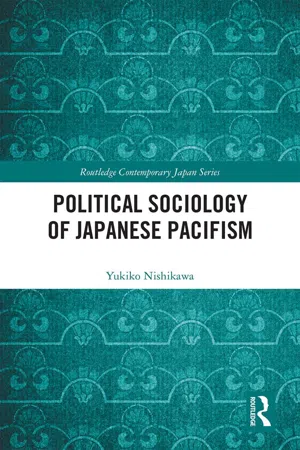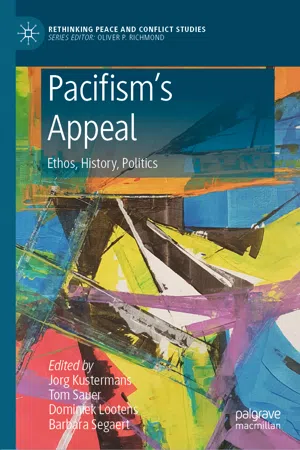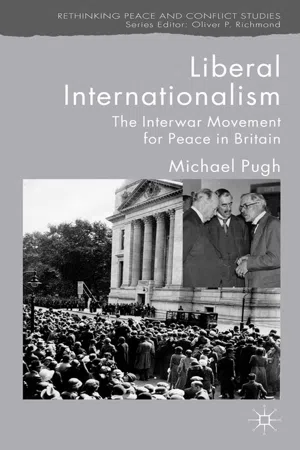Politics & International Relations
Anarcho-Pacifism
Anarcho-pacifism is a political philosophy that combines elements of anarchism and pacifism. It advocates for a society without a centralized government and opposes all forms of violence, including war and coercion. Anarcho-pacifists believe in nonviolent resistance and direct action as the means to achieve social and political change.
Written by Perlego with AI-assistance
Related key terms
1 of 5
9 Key excerpts on "Anarcho-Pacifism"
- eBook - PDF
Transformative Pacifism
Critical Theory and Practice
- Andrew Fiala(Author)
- 2018(Publication Date)
- Bloomsbury Academic(Publisher)
In light of these concerns, separatism and non-resistance evolved – through the work of Gandhi, King, and others – to become non-violent resistance that engages the world and focuses on the work of love and justice. Thus negative – separatist and anarchist – formulations of pacifism are complemented by a more positive vision of political life. Pacifist political philosophy postulates peace, both international and domestic, as the final goal of political life, while maintaining that non-violent means must be employed in pursuit of peace. Pacifism as a political philosophy has a utopian focus: it establishes a goal or ideal for development. But pacifism also focuses on procedural questions within the non-ideal world and melioristic efforts at transforming that world, emphasizing non-violent means for bringing about social change as well as institutional mechanisms that support peace, equality, liberty, and social justice. Pacifism in political philosophy often shows up in discussions of international relations, for example – as a possible way of responding to the challenges of international conflict. Cosmopolitanism and liberal internationalism can be conceived in relation with pacifism: these ideas share with pacifism the goal of creating a just and peaceful international order, even if they are willing to tolerate the use of violence in pursuit of those means. 23 There will be a continuum here uniting the pacifists and the cosmopolitans with advocates of just wars and peace-keeping force at one end and less permissive forms of pacifism that emphasize non-violent solutions at the other. 22 See Elaine Malloy, Daniel Malloy, and Allan J. Ryan, Hopedale (Charleston, SC: Arcadia Books, 2002). 23 See Andrew Fiala, ‘Cosmopolitanism, Anarchism, and Injustice at the Border’, in Eddy Souffrant, ed., A Future Without Borders: Essays in Cosmopolitan Peacebuilding (Leiden, NL: Brill, 2016). - eBook - PDF
- Iain Atack(Author)
- 2020(Publication Date)
- EUP(Publisher)
On the European continent pacifists were often drawn from circles influenced by the libertarian anarcho-syndicalist tradition. 58 Both approaches shared a suspicion of a strong centralised state and a commitment to cooperation rather than competition as the basis for an economy that served human needs rather than private profit. Tolstoy went so far as to question ‘the institution of property’ itself, again in the anarchist tradition, ‘at least insofar as property required force to defend it’. 59 He also suggested ‘armies are only needed by governments in order to dominate their own working-classes’. ‘Defence against foreign enemies is only an excuse.’ 60 The importance of this implicit anarcho-socialism is that it suggests domestic social and political revolution is a necessary precursor to the elimination of war and armed conflict and the transformation of inter-national politics. In a sense, domestic social and political change provides the necessary link between pacifism as an individual and personal ethic and the elimination of war as a feature of international relations. Again, according to Brock, Tolstoy made this connection explicit: ‘Tolstoy introduced a new note into the pacifist argument when he pleaded for a radical, if somewhat vague, restructuring of society as an essential pre-requisite for establishing international peace and brotherhood.’ 61 The political organisation of society, and patterns of ownership of economic resources and the means of production, must be radically altered for pacifism to become effective and relevant in the international realm as well as a distinctive moral position. This points to a crucial distinction, to which I alluded earlier, between reformist and revolutionary versions of pacifism. Reformist pacifism seeks alternative, nonviolent methods for defending conventional political structures, such as the nation-state. These most often take the form of various proposals for ‘civilian-based defence’, for example. - eBook - ePub
- Brian Orend(Author)
- 2019(Publication Date)
- Polity(Publisher)
3Pacifism: Ethics, Cosmopolitanism, and Non-violencePacifism is a form of idealism. If realism recommends group selfishness, lack of trust, and national egoism, then idealism – as the opposing “big-picture” perspective on foreign policy – recommends a kind of other-regarding altruism, stressing an ethical imperative not merely to forward the relative standing of one’s “in-group” but, rather, to use one’s resources to do what one can to make the world a better place. To this extent, pacifism is both individual and cosmopolitan, in contrast to realism’s tribal nationalism. Individual, in viewing all human beings with ethical concern; and cosmopolitan, in denying that national borders have deep moral significance. What matters morally is that we do the right thing, and we respect everyone’s lives and rights. And it’s difficult to square that principle with violent armed conflict, whether for reasons of smart strategy (realism) or of justice (just war theory).In contrast to the gritty realist ethos of “national security in an insecure world,” pacifism offers a vision of “human security in a better world,” where human security refers to the well-being of individual people and their feeling not merely physically safe from things like crime, terrorism, and foreign invasion but more broadly empowered and enabled to live their lives in a satisfying way.1 A pacifist, for instance, would consider as sheer waste the enormous military expenditures by – and vast martial organizations within and across – nation-states, and experience a sad sense of lost possibility and an angry conviction regarding this wastage in comparison to what such resources could do in terms of food, housing, education, technology, health care, and research and development for the future.23.1 Defining Pacifism
There’s pluralism within pacifism, as with the other traditions. Two big distinctions stand out. The first is between pacifism as non-violence versus pacifism as (mere) opposition to war. The second is between religious versus secular (i.e., non-religious) forms of the doctrine. These hook into further sub-distinctions, as we’ll see. Let’s consider both, explaining how, for our purposes, it’s most germane to understand pacifism as opposition to warfare, rooted in secular moral reasons. - eBook - ePub
- Mark Bevir(Author)
- 2010(Publication Date)
- SAGE Publications, Inc(Publisher)
PPACIFISMThe term pacifism, which is now applied to a number of historical and contemporary stances toward war, did not appear until the early twentieth century. In 1902, a Frenchman at an international peace congress used, and perhaps even coined, the word pacifism to mean antiwarism. Its linguistic roots, of course, suggest more positive implications: making or doing peace.Nevertheless, the common element in pacifist positions is negative: disavowal of war and/or participation in war. Many pacifists disavow both a state’s use of armed force in interstate conflicts and their own personal participation in such armed force. Yet this distinction is important because some pacifists disavow participation in war, seeking to disassociate themselves from their government’s policies by refusing to serve in the military, pay taxes, and so forth, without seeking to alter their government’s military policies or to propose a political alternative to those policies.Pacifism is not necessarily passive in the face of perceived wrongs—that is, it usually opposes, often quite vigorously, injustice and other wrongs—but it calls for nonviolent means to overcome such policies and actions. It agrees with just war proponents about the goal of a just peace, but it disavows the use of armed force to achieve that goal and/or participation in the use of armed force.Types of PacifismPacifism is distinguished from several other approaches to war, particularly just war theories (which hold that war can be ethically justified under certain conditions) and political realism (which downplays the role of moral norms in the realities of international life and stresses the need to wage war in some circumstances). All of these approaches have a variety of forms. It is important to recognize the numerous varieties of pacifism because interpretations and evaluations depend on the type(s) of pacifism under examination. - eBook - PDF
- Jeroen van den Hoven, Seumas Miller, Thomas Pogge(Authors)
- 2017(Publication Date)
- Cambridge University Press(Publisher)
Such a definition of pacifism is misleading in two ways. Firstly, though there have of course been absolutist pacifists, many of those who are clearly to be counted as pacifists, including such paradigm pacifists as Gandhi, were not absolutists. Secondly, such a definition turns pacifism into a matter of individual moral con- viction. In fact, pacifism has been an important social movement, with specific aims – the prevention of war(s) – and like most social movements, attracted sup- porters who were motivated by a range of various moral, political and religious commitments. What has united actual peace movements is the conviction that non-violent methods, rather than military force, can be used to deter or resist the violent usurpation of political power by outside forces. (So just as a social- ist isn’t simply a person who believes in sharing, or a capitalist a person who likes money, a pacifist isn’t simply a person who rejects violence.) The dispute between the pacifist and the supporter of military force can thus be seen as a disagreement view about policy – will non-violent or armed resistance more reliably bring about mutually desired results? Like the pacifist their (reasonable) opponents agree that violence is, in itself a bad thing. Since at least the end of the Second World War what might be called a broadly liberal conception of political violence has underpinned the institution of war – the tools dedicated to the preparation for, and fighting of, wars, including the extensive standing armies, armaments manufacturers, intel- ligence agencies and the like that all modern states possess, as well as the rules and norms that govern the use of those tools. According to those rules, the legit- imate goals of the national armed forces which are at the heart of the institution of war are deterrence of external violent usurpation of political authority and resistance to such usurpation if it is nevertheless attempted. - eBook - ePub
- Yukiko Nishikawa(Author)
- 2018(Publication Date)
- Routledge(Publisher)
pacificism.Ceadel (1980: 4) defines pacifism as ‘the personal conviction that it is wrong to take part in war or even, in an extreme version, to resist evil in any way’. This definition carries absolutist implications, although there are variations even within absolutist pacifism.13 Only a national policy of total disarmament can prevent a conflict from emerging between the pacifist’s conscience and his or her duty as a citizen. Ceadel (1980: 4–5) adds that pacifism is not primarily a political idea but a moral creed.On the other hand, pacificism is defined asa political idea since it believes that implementing reforms at the political level rather than waiting for profound changes to occur in men’s consciences offers the only realistic chance of limiting the use of force and of curbing warfare as a human institution.(Ceadel 1980: 5)Ceadel (2010: 323) views this approach as a reformist effort and as a product of the Enlightenment.14 Reformists argue that war can be abolished by changing political structures and that, until we have reached that point, the use of force is permissible though it should not be implemented in an aggressive way. In this context, there is no limit on the scope of reformism, and thus pacificism can encompass liberal, socialist or even feminist reforms. If pacificism is defined as Ceadel suggests, it is always associated with a certain political position or ideology, such as liberalism, socialism or feminism, as an underlying force driving pacificist conduct.From Ceadel’s clarification, the reformism contained in pacificism can involve seeking changes in other countries or anywhere in the world. As cosmopolitan arguments to promote peace elsewhere in the world are criticized as ‘idealistic, inappropriate or dangerous’ (Dower 2009: 157), Ceadel considers that pacificism shares such danger to promote reforms potentially with the use of force to achieve peace. However, distinctions between pacifism and pacificism - eBook - ePub
- Nigel Dower(Author)
- 2013(Publication Date)
- Polity(Publisher)
What is central to pacifism and nonviolence is an ethical response to situations and others’ actions which are unpeaceful, unjust, and so on. However, the philosophy of nonviolence is on the face of it broader, in the sense that it is about how one responds to other human beings in all kinds of situations, ranging from overt violence and war, through situations of conflict, to aggressive or irritating behaviour in everyday transactions. Pacifism, either in the form that is against all killing or in the form that is against war specifically, is more precisely about the wrongness of using killing force in response to such situations. Theoretically a pacifist could be quite aggressive in ways that fell short of using killing force, and could have negative and condemnatory assessments of others. That said, most pacifists are in fact committed to the philosophy of nonviolence in human relationships more generally and also to promoting peace, justice, etc. (see section 2). Likewise, most advocates of nonviolence are also dedicated to promoting peace, social justice – including ‘fighting’ injustice – and generally desirable social change. There has in recent years been a marked move in the direction of people describing themselves as committed to nonviolence rather than pacifism because of its more overt general approach, but on more careful analysis we can see that, while there are significant variations in both ideas, given most people’s actual fleshing out of what their respective commitments to nonviolence and pacifism amount to, they come to much the same thing. It is largely a question of terminological preference. I shall, however, look at them separately, since the way they are presented can be somewhat different.2 Nonviolence
2.1 Violence and nonviolence
Nonviolence is partly clarified by its contrast to violence. Violence in itself is a concept that has many different contested meanings. One can identify first what is often called the paradigm case of violence. For instance, Robert Holmes called it ‘the use of physical force to cause harm, death, or destruction’ (Holmes 1990: 1). John Harris earlier called it the ‘rape, murder, fire, sword paradigm’ (Harris 1979: ch. 2), but he was quick to point out that, although these examples are clearly instances in which an act of violence is also a case of ‘acting violently’, such acts need not involve ‘acting violently’: someone who poisons a water supply in order to kill the villagers may perform his deed ever so smoothly! So too does a commander who orders his men to shoot others, even though he uses only his voice. What is central to the act of violence is the intention (directly, as in shooting a gun, through a longer causal chain, as in the poisoning case, or via the mediation of other agents, as in giving orders) to cause physical harm, destruction or death. Many would include – as Harris does – acts about which it is reasonably foreseeable that they will have these effects even if not intended, and likewise a threat of violence as a way of controlling others is violence.1 - eBook - ePub
Pacifism’s Appeal
Ethos, History, Politics
- Jorg Kustermans, Tom Sauer, Dominiek Lootens, Barbara Segaert, Jorg Kustermans, Tom Sauer, Dominiek Lootens, Barbara Segaert(Authors)
- 2019(Publication Date)
- Palgrave Macmillan(Publisher)
It was a term that had not only philosophical but, more importantly, socio-political connotations, highlighting advocacy to prevent war and preserve peace. Pacifism…meant social action. It was not merely a philosophy but a political program and a commitment to social change. It was distinct from the quietist tradition of some religious sects, whose members tended to withdraw from public life and cede to the state the realm of practical politics. This was not what the early twentieth-century pacifists had in mind. Arnaud sought to distinguish pacifists from those who merely hope or pray for peace. (Cortright 2008, p. 9) As Arnaud was known for saying, ‘We are not passive types… we are pacifists’ (Cooper 1991, p. 60). With this statement, he acknowledged a broader cultural and religious heritage that had influenced desire for peace in the European context, even while seeking to correct what he saw as a spirit of detachment or disengagement that sometimes accompanied this legacy. On the one hand, it is arguable that Arnaud might not have been able to envision a new ‘-ism’ involving active peace promotion without the background presence of religious ideals, and of groups with clearly articulated precepts regarding the renunciation of violence. On the other hand, it would appear that he also regarded past expressions of peace-related idealism as limiting with respect to the purposes he had in mind. Christian religiosity was therefore present at the birth of modern pacifism in the European context. Yet the term that would inspire the numerous nonviolent activists and movements was not exclusively religious and reflected human responses to both dangers and opportunities of the historical juncture within which it was coined - eBook - PDF
Liberal Internationalism
The Interwar Movement for Peace in Britain
- M. Pugh(Author)
- 2012(Publication Date)
- Palgrave Macmillan(Publisher)
6 Resistance: Pacifism and the Power of Defiance 89 As well as fostering interest in an IPF, the air menace and the disar- mament deadlock generated renewed resistance to involvement in war and antipathy to core liberal internationalist expectations of collective security. ‘My belief in absolute pacifism’, wrote Bertrand Russell, ‘is lim- ited to the present time, and depends upon the destructiveness of air warfare’ . 1 But the growth of war rejection from the concern of small peace societies into a mass phenomenon was also attributable to the failure of collective security in Asia. This chapter begins with the change in the scale of ‘pacifist’ oper- ations in relation to the impact of Japanese aggression. Initially, contemporary critics of British policy seemed as uncertain as the poli- cymakers themselves, 2 and the analysis indicates the main lines of dissent that heightened recriminations and resistance. The following section explains the role of what was loosely called ‘pacifism’ in the years bordered by the 1931 Manchurian and 1935 Ethiopian crises, and to see how the crisis in elitist liberal governmentality increased resistance to liberal internationalism, producing further shifts, distur- bances and trespassing. Schisms arising from the mobilisation of peace sentiment disturbed existing boundaries of opinion and organisation. Consequentialists such as Norman Angell emphasised that there could be no winners in war; Marxist–Leninists promoted war resistance to maintain the class struggle, whereas deontologist, moral, Christian and humanist pacifism stressed individual conscientious objection. 3 The distinctions were not always clear. George Lansbury combined Christian and socialist pacifism; and in 1940 Russell adopted a just war stance, conditional on the existence of virtue among those resisting aggression. But the renaissance of these two types of war rejection – Marxist resistance to a capitalist war and individual moral resistance
Index pages curate the most relevant extracts from our library of academic textbooks. They’ve been created using an in-house natural language model (NLM), each adding context and meaning to key research topics.
